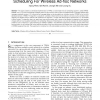Free Online Productivity Tools
i2Speak
i2Symbol
i2OCR
iTex2Img
iWeb2Print
iWeb2Shot
i2Type
iPdf2Split
iPdf2Merge
i2Bopomofo
i2Arabic
i2Style
i2Image
i2PDF
iLatex2Rtf
Sci2ools
111
click to vote
MOBIHOC
2006
ACM
2006
ACM
DRAND: : distributed randomized TDMA scheduling for wireless ad-hoc networks
This paper presents a distributed implementation of RAND, a randomized time slot scheduling algorithm, called DRAND. DRAND runs in O() time and message complexity where is the maximum size of a two-hop neighborhood in a wireless network while message complexity remains O(), assuming that message delays can be bounded by an unknown constant. DRAND is the first fully distributed version of RAND. The algorithm is suitable for a wireless network where most nodes do not move, such as wireless mesh networks and wireless sensor networks. We implement the algorithm in TinyOS and demonstrate its performance in a real testbed of Mica2 nodes. The algorithm does not require any time synchronization and is shown to be effective in adapting to local topology changes without incurring global overhead in the scheduling. Because of these features, it can also be used even for other scheduling problems such as frequency or code scheduling (for FDMA or CDMA) or local identifier assignment for wireless n...
MOBIHOC 2006 | Slot Scheduling Algorithm | Wireless Mesh Networks | Wireless Networks | Wireless Sensor Networks |
Related Content
| Added | 24 Dec 2009 |
| Updated | 24 Dec 2009 |
| Type | Conference |
| Year | 2006 |
| Where | MOBIHOC |
| Authors | Injong Rhee, Ajit Warrier, Jeongki Min, Lisong Xu |
Comments (0)

